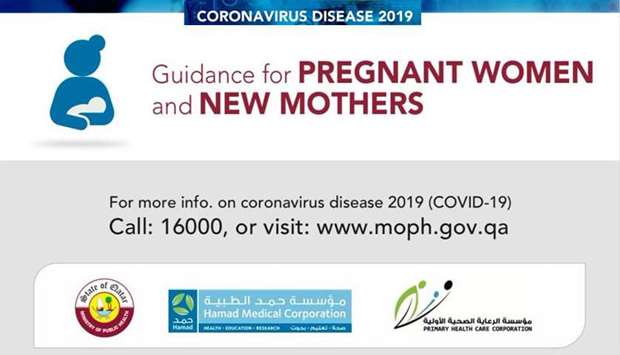The Ministry of Public Health (MoPH) has issued guidance for pregnant women and new mothers in view of the Covid-19 outbreak.
The guidelines are available at https://www.moph.gov.qa/Style%20Library/MOPH/Videos/guidepregnant.pdf.
For more information, one can also call 16000.
Who is this guidance for?
This guidance is for women in Qatar who are pregnant or have just given birth.
What is Coronavirus disease (Covid-19)?
Covid-19 is a highly contagious disease with symptoms such as fever, cough and shortness of breath.
How do people get infected?
Coronavirus is transmitted, like any other viruses that attacks the respiratory system, from one infected person to another in the droplets when they sneeze, cough or speak especially if at a distance of less than 1m or 2m.
It can also be transmitted through close contact with the infected person or touching surfaces.
Are pregnant women at higher risk?
Research is currently under way to understand the impacts of Covid-19 infection on pregnant women.
Data are limited, but at present there is no evidence that they are at higher risk of severe illness than the general population.
However, due to changes in their bodies and immune systems, it is known that pregnant women can be badly affected by some respiratory infections.
It is, therefore, important that they take precautions to protect themselves against Covid-19, and report possible symptoms (including fever, cough or difficulty breathing) to their healthcare provider.
Should pregnant women be tested for Covid-19?
As pregnant women who have Covid-19 may need specialised care, the World Health Organisation (WHO) recommendations are that pregnant women with symptoms of Covid-19 should be prioritised for testing.
Check with your doctor or midwife regarding your situation.
Can Covid-19 cause problems for a pregnancy or the baby?
We do not know at this time if Covid-19 would cause problems during pregnancy or affect the health of the baby after birth and therefore recommend taking all precautions to reduce the risk of infection.
There have been a small number of reported problems with pregnancy or delivery (for example, preterm birth) in babies born to mothers who tested positive for Covid-19 during their pregnancy.
However, it is not clear that these outcomes were related to maternal infection.
Can Covid-19 be passed from a pregnant woman to the fetus or newborn?
We still do not know if a pregnant woman with Covid-19 can pass the virus to her fetus or baby during pregnancy or delivery.
To date, the virus has not been found in samples of amniotic fluid or breastmilk.
Can women with Covid-19 breastfeed?
Yes. Women with Covid-19 can breastfeed if they wish to do so.
They should:
l Practise respiratory hygiene during feeding, wearing a mask where available
l Wash hands before and after touching the baby
l Routinely clean and disinfect surfaces they have touched
Can I touch and hold my newborn baby if I have Covid-19?
Yes. Close contact and early, exclusive breastfeeding helps a baby to thrive.
You should be supported to:
l Breastfeed safely, with good respiratory hygiene
l Hold your newborn skin-to-skin
l Share a room with your baby You should wash your hands before and after touching your baby, and keep all surfaces clean.
I have Covid-19 and am too unwell to breastfeed my baby directly. What can I do?
If you are too unwell to breastfeed your baby due to Covid-19 or other complications, you should be supported to safely provide your baby with breastmilk in a way possible, available, and acceptable to you.
This could include:
l Expressing milk
l Relactation
l Donor human milk
If you are pregnant, how can you protect yourself against Covid-19?
Pregnant women should take the same precautions to avoid Covid-19 infection as other people.
You can help protect yourself by:
l Washing your hands frequently with an alcohol-based hand rub or soap and water
l Keeping space between yourselves and others and avoiding crowded spaces
l Avoiding touching your eyes, nose and mouth
l Practising respiratory hygiene. This means covering your mouth and nose with your bent elbow or tissue when you cough or sneeze. Then dispose of the used tissue immediately.
If you have fever, cough or difficulty breathing, seek medical care early.
Call before going to a health facility, and follow the directions of your team of healthcare professions.
Pregnant women and women who have recently delivered — including those affected by Covid-19 — should attend their routine care appointments but check with your healthcare team first.
What should pregnant women or new mothers do if they get the virus?
If you are showing symptoms such as coughing, sneezing, fever or shortness of breath, you may need assessment by healthcare professional.
Start self-quarantine, avoid any contact with others and call the national Covid-19 hotline on 16000;
Practise the 'Sick day rules' for pregnancy: keep hydrated and drink plenty of water; eat a healthy diet; and rest and postpone exercise
Mouth gargle with warm water and salt
Monitor temperature, when needed use acetaminophen (Paracetamol/Panadol) rather than anti-inflammatory (ibuprofen/Advil)
Always follow a healthcare professional team's recommendations.

